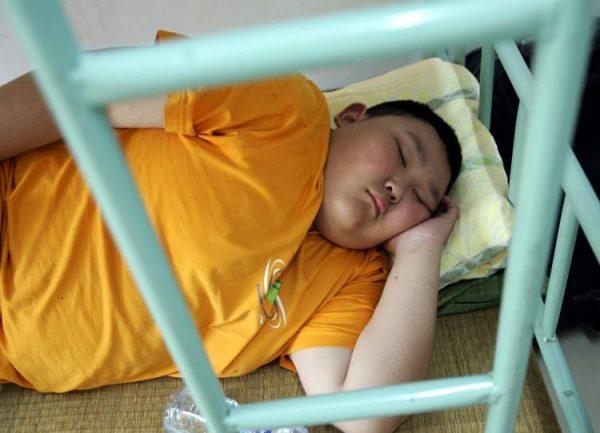Commentary
Not content with cracking down on healthcare, education, and property, the Chinese Communist Party (CCP) also intends to crack down on childhood obesity.
Such a move, on closer inspection, is not surprising. After all, 20 percent of children in China are either overweight or obese. Although others are eager to tell us otherwise, nothing good comes from carrying excessive amounts of weight.
A South China Morning Post article describes the workout schedule of Steve Li. On Saturdays, Li swims for 1 hour and 30 minutes; this is followed by a couple of hours of roller-skating training. “In the afternoon,” wrote the author Jane Cai, Li “sweats on a badminton court for two hours.” Not finished there, the tireless Li ends the day “with 30 minutes of rope skipping.” A remarkable amount of exercise, especially when one considers the following: Li is a 9-year-old child.
His routine sounds extreme because it is extreme. In fact, it’s bonkers. No child should be exercising this excessively in one day. However, this is China, and the CCP is desperate to shake off the “Sick Man of Asia” moniker. The CCP appears desperate to turn China into a country full of people like Steve Li. After dramatically reducing the amount of video games available to children under the age of 18, China’s youth have more time to exercise–whether they like it or not.

Why should any of this matter to American readers? China, the United States’ biggest rival, is putting a plan in place to ensure its next generation of citizens are healthier. Of course, one can debate the definition of healthy. How healthy can one be if subjected to a grueling 996 work culture? How healthy can a society living under a cruel and unusual social credit system actually be?
These are relevant questions. However, for the purpose of this piece, I am talking about slimmer, fitter citizens, the kind of people who can walk up a flight of stairs without needing the assistance of a ventilator. In the United States, obesity now affects one in five children and adolescents, according to the Centers for Disease Control and Prevention (CDC). In other words, the situation in the United States is just as bad as it is in China.
As Beijing targets this weighty issue with a heavy hand, should the Biden administration do the same?
For well over 18 months, Americans have been told to mask up, isolate, wash their hands repeatedly, and refrain from visiting loved ones. Yet no one—and I mean no one—from the Biden administration has discussed the importance of exercise and sensible eating. It is not controversial to say the following: COVID-19 has always posed more of a risk to the obese than to their slimmer counterparts. Nine out of ten COVID-19 deaths, for example, have been in countries with high rates of obesity. In the United States, the state of Mississippi has one of the highest COVID-related death rates in the land; it also has the highest obesity rate. Meanwhile, Hawaii has the lowest obesity rate; it also has the lowest amount of deaths from COVID-19. Coincidence? I think not. Not once, in his hundreds of press briefings and interviews, has Dr. Anthony Fauci, the man tasked with the job of providing Americans with health advice, discussed the importance of healthy eating and cardiovascular health.
To address the problem of obesity, it must first be acknowledged. Although one needn’t dedicate 6 hours and 30 minutes of their day (like the aforementioned Steve Li) to exercise, some sort of action must be taken. The importance of Americans’ food environment cannot be emphasized enough. If you are what you eat, then where is the United States heading? Nowhere good.
In less than a decade, according to current estimations, the world will be home to more than 250 million obese children; 1 in 15 of these will be American. While the world is understandably fixated on the current pandemic, few are discussing the obesity epidemic in the United States. Overweight and obese children are likely to become overweight and obese adults; they’re also more likely to develop diabetes and cardiovascular diseases at a much younger age. Childhood obesity, now the most serious public health challenge of the 21st century, has a profoundly negative impact on children’s physical and emotional well-being; it shatters their self-esteem. There exists a strong correlation between childhood obesity and poorer educational attainment.
Again, nothing—absolutely nothing—good comes from being obese. Why, then, does the Biden administration fail to mention this very obvious fact? The answer is actually rather obvious. As society becomes more fragile, many of us cannot bear to hear the truth, no matter how urgent it needs to be heard. But tiptoeing around this very costly issue helps no one. This is not a call to turn America’s children into Steve Li-inspired, exercise fanatics. This is a call to help millions of children avoid a future full of misery and pain.
Views expressed in this article are opinions of the author and do not necessarily reflect the views of The Epoch Times.





